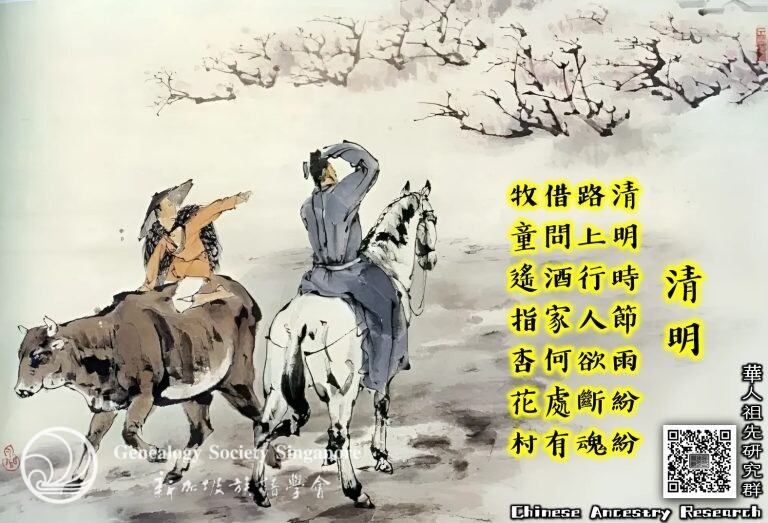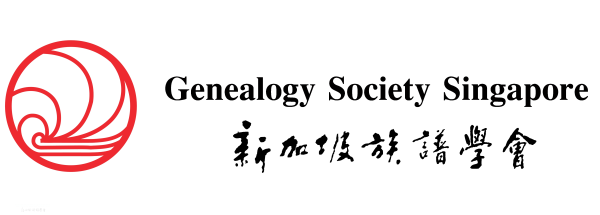
Why We Remember
In Chinese culture, there’s one virtue that holds up the roof of the family home: filial piety — xiào 孝. It’s the reason we save the last dumpling for Grandma, the reason we don’t interrupt elders mid-story, and the reason some of us still answer phone calls from our parents with a slightly nervous “I’m fine! I’m eating!”
But xiào 孝 doesn’t stop at your parents. It flows upstream, all the way to those who came before them — and keeps flowing, even after they’ve left this world. For the Chinese, respecting the dead is never about morbid rituals. It’s about continuity, about knowing where you came from so you know who you are.
Western cultures have All Saints’ Day or All Souls’ Day. We have Qīngmíng 清明 — a day when we don’t just mourn, we remember, we reunite, and yes, we sometimes roast an entire pig next to a grave while children chase each other through the weeds.
Qīngmíng always falls in early April, typically between April 4 and April 6. This year, it lands on Friday, April 4, 2025 — a perfect window of spring warmth and clarity. The skies are bright, the trees are green, and the winds carry the scent of new life. If the Chinese were going to choose a day to honor their dead, they made it count — the most beautiful day of the season, if not the whole year. That, in itself, is an act of filial reverence: giving your ancestors the very best.
There’s a reason the name “Qīngmíng 清明” literally means “clear and bright.” It’s a day to sweep away dust — from the tomb, from the altar, and from the memories that have grown a little hazy. It’s a day to dust off your family’s stories, and maybe even tell your kids why their surname isn’t just a name, but a thread in a centuries-old tapestry.
And while the term Qīngmíng began as part of the ancient solar calendar, that’s not what made it sacred. It became sacred because generation after generation chose to keep coming back — to the same mountainside, to the same village path, to the same stone where great-grandfather’s name is carved.
The Early Roots of Qīngmíng 清明
The Early Roots of Qīngmíng 清明
Long before Qīngmíng 清明 became a festival of roast pigs, red candles, and bamboo rakes, it began as something far simpler — a seasonal marker on the ancient Chinese calendar. As early as the Zhōu Dynasty 周朝 (c. 1046 – 256 BCE), the ancestors of China were already watching the stars and mapping out the rhythms of the year. Among these rhythms was a solar term called Qīngmíng 清明, when the air turned clear, the sunlight bright, and all things began to grow.
But the Zhōu were not only timekeepers — they were also ritual keepers. The Rites of Zhōu 周禮 describe a set of officials known as the Zhǒngrén 冢人 and Mù Dàfū 墓大夫, whose job was to oversee state-level tombs and ancestral graves. These weren’t just caretakers — they were guardians of memory, charged with ensuring that ancestors received proper offerings and were never forgotten.
By the time of the Warring States Period 戰國時代 (475 BCE to 221 BCE), even ordinary folk were visiting family tombs, bringing food and wine, and quietly bowing before their ancestors’ names. It was no longer just an imperial affair. The idea that you should honor your dead — even if they’d been gone for generations — had taken root among the people.
But here’s the twist: at this stage, there was no “Qīngmíng Festival” yet. The ancestral rites existed, and the Qīngmíng solar term existed — but they hadn’t been officially joined together. That came later. And like many things in Chinese culture, it wasn’t through sudden invention, but gentle layering, year after year, dynasty after dynasty.
By the time the Táng Dynasty 唐朝 (618 – 907 CE) rolled around — with its poets and its pageantry — the connection between Qīngmíng and tomb-sweeping had been cemented. Rulers encouraged the public to observe these rites as acts of filial piety and Confucian virtue, and Qīngmíng slowly absorbed elements from older springtime festivals like Cold Food Day 寒食節 and Shàngsì 上巳, a day once dedicated to bathing in rivers to cleanse away misfortune and enjoying spring outings in nature. Kite flying, cold food, spring strolls, and ancestral offerings all melted together into a single season of remembrance and renewal.
But if you ask most people today, especially those whose families came from Southern China, they don’t speak in dynastic terms. They just remember the walk up the hill to the family tomb, the smell of incense, the paper money catching fire, and their parents or grandparents saying, “Bow. This is where you came from.”
Up the Hill, Down to the Roots
Up the Hill, Down to the Roots
In southern China, Qīngmíng 清明 is more than a date — it’s a feeling. The air smells like grass and smoke. Roosters crow somewhere in the distance. A great-aunt is yelling at the cousins for forgetting the incense sticks again. This is not a quiet ritual — it’s a noisy, messy, utterly human reunion with the dead.
They call it Sǎo Shān 掃山 or Bài Shān 拜山 in Guangdone 廣東. In Fujian 福建, some call it Guà Mǔ 掛墓, and in the Hakka hills, it might just be “going up the mountain.” But whatever the name, the scene is familiar: families making their way to ancestral tombs, arms full of roasted meats, fruits, joss paper folded into gold ingots, and maybe a thermos of hot tea. Children carry brooms. Someone always forgets the matches.
Graves are cleared of weeds, new earth is packed around the stone, incense is lit, and the offerings are laid out like a banquet. There’s talking, there’s laughter, and sometimes even a full picnic — not because anyone’s being disrespectful, but because this is a gathering. The living and the dead, together again, if only for an hour.
In places like Hainan 海南 and Taiwan 台灣, the customs take slightly different forms. Some offer whole chickens or glutinous rice cakes. Others burn paper mansions and iPhones for their ancestors in the afterlife. In Táiwān, Qīngmíng is a public holiday — and one of the rare times families will traverse the island just to return to a single tomb. These variations are many, but the heartbeat is the same: clean the grave, offer what you can, and remember who you are.
And then there are those who can’t return to the ancestral mountain — because the mountain is in another country. Across the Chinese diaspora, from Manila to Montreal, the Qīngmíng spirit has crossed oceans and adapted to new worlds. Some families keep altars at home, with framed photographs and bowls of fruit. Others visit local cemeteries, paying tribute to more recent ancestors who built new lives far from the village where it all began. In places like Southeast Asia, Chinese associations sometimes organize group visits to public gravesites, lighting incense and chanting in unison on behalf of all those whose kin are too far, too scattered, or too forgotten.
Sometimes, Qīngmíng looks like three generations crowded around a video call, watching a cousin in Chaozhou lay down incense on behalf of the whole family. Sometimes it’s just one person in a kitchen, lighting a stick of incense beside an old photo, whispering a thank-you no one else can hear.
In every form, in every country, the meaning remains unchanged. Qīngmíng is not just about remembering the dead. It’s about reaffirming the living — that we are still connected, still grateful, still carrying the names that made us. Whether you’re tending a tomb under the camphor trees of Fujian or googling how to fold joss paper in a New Jersey apartment, you’re doing the same thing your ancestors did: looking backward, bowing forward, and keeping the line unbroken.
A Poem for Qīngmíng
A Poem for Qīngmíng
Across dynasties and across oceans, no words have captured the spirit of Qīngmíng quite like this short, haunting poem by Dù Mù 杜牧 (803–852 CE), a master of the late Táng Dynasty 唐朝:
清明時節雨紛紛,
路上行人欲斷魂。
借問酒家何處有?
牧童遙指杏花村。
路上行人欲斷魂。
借問酒家何處有?
牧童遙指杏花村。
A drizzling rain falls on Qīngmíng Day,
The mourner’s heart is breaking on the way.
I ask where can a tavern be found?
A shepherd boy points to Apricot Blossom Town.
The mourner’s heart is breaking on the way.
I ask where can a tavern be found?
A shepherd boy points to Apricot Blossom Town.
Here, sorrow walks the road with the living. The rain doesn’t merely fall — it carries memory. The traveler, lost in thought, searches for something to soothe the spirit. And somewhere in the mist, a boy points the way — toward warmth, toward rest, toward hope.
This is the essence of Qīngmíng 清明: to remember the sorrow, but never be lost in it. To carry forward the names, the stories, and the strength of those who came before us — not as weight, but as direction.
A Quiet Reflection
Whether your ancestors lie in a village grave in Méixiàn 梅縣, in an overgrown cemetery outside Jakarta, or in unmarked soil somewhere in Cuba, your remembrance matters. Every name you uncover, every story you preserve, every photo you restore — it is all part of an unbroken ritual.
You are not alone. You are walking a road that millions before you have walked. And though some of us can no longer kneel before the old stones, we can still bow in spirit. We can still honor. We can still remember.
This Qīngmíng, may we each take a step back toward the mountain — or toward the memory of one.
And may the voices of our ancestors echo just a little louder in our hearts.
View the original Chinese Ancestry Research’s Facebook post here
